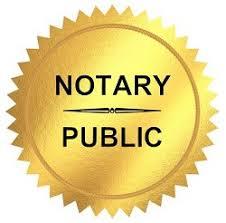Demystifying Notarial Job: Simplifying the Duty and Value of Notaries
In the complex web of lawful documents and confirmation, notaries stand as columns of assurance and authenticity. Their duty, typically shrouded in secret for lots of, carries significant weight in making sure the credibility and honesty of essential files. As guardians of legitimacy and reality, notaries play a crucial component in our society, yet their job is not constantly completely understood. By deciphering the complexities surrounding notarial methods and dropping light on the importance of their acts, a more clear understanding arises of the essential function notaries play in upholding the fabric of legal and legal contracts.
The History of Notarial Job
Just how did notarial job evolve gradually to become an important part of legal and business purchases? The background of notarial job days back to ancient people, where scribes played an essential role in videotaping important information and validating documents. As cultures proceeded, the demand for an extra formalized system to make sure the legitimacy of contracts occurred. This resulted in the development of notaries, people selected by the state to serve as neutral witnesses in lawful matters.
During the Center Ages, notaries gained prominence in Europe, with their functions expanding to include composing legal records, licensing trademarks, and preserving documents. The rise of worldwide profession even more emphasized the relevance of notarial operate in confirming contracts and contracts throughout boundaries.
In the modern period, notaries continue to play a crucial function in lawful and organization deals by validating identities, confirming the authenticity of papers, and stopping fraud. Their duty in accrediting the validity of contracts adds a layer of safety and depend the ever-evolving landscape of commerce and regulation.

Obligations and Obligations of Notaries
Notaries play a crucial duty in confirming the credibility of papers and the identification of signatures. One of their primary responsibilities is to witness the finalizing of vital records, such as wills, actions, and agreements, to make certain that all events are getting in into arrangements purposefully and willingly.
They certify copies of initial records, supplying guarantee to institutions that the copies are real replicas of the originals. In general, the responsibilities and obligations of notaries are crucial in protecting the integrity and validity of numerous records and deals - DIRCO.
Notarial Certificates and Signatures
Exemplifying careful attention to information, notarial certificates and signatures work as necessary parts in verifying the authenticity of lawful documents. Notarial certificates typically have crucial information such as the date of registration, the names of the signatories, a summary of the record, and the notary's main seal. These certifications provide a clear record of the notarial act, making sure that the paper can be quickly identified and mapped back to the notary who looked after the process.
Signatures play a crucial function in notarial job, as they represent the contract and permission of the celebrations entailed. Notaries meticulously witness the finalizing of records to confirm the identity of the notaries and verify that they are authorizing of their very own free choice. By affixing their main seal and trademark to the file, notaries certify that the needed procedures have actually been adhered to which the paper is legitimate and enforceable.
Fundamentally, notarial certificates and trademarks are the hallmark of credibility in lawful purchases, supplying assurance to all parties involved that the papers are reputable and binding.
Value of Notarial Acts
Notarization Process Clarified
The registration procedure commonly starts with the private presenting the record to a notary public. As soon as the identification is verified, the notary makes sure that the specific authorizing the file does so willingly and without any kind of coercion.

Verdict

Notarial certificates typically contain vital details such as the date of registration, the names of the notaries, a description of the file, and the notary's official seal. These certificates supply a clear document of the notarial act, making sure that the paper can be easily determined and traced back to the notary that managed the procedure.
By fastening their main seal and trademark to the file, notaries license that the needed treatments have been followed and that the file is legitimate and enforceable.
By confirming the identity of the signatories, confirming their desire to get in into the arrangement, and licensing the date and location of the finalizing, notaries play an essential function in maintaining the credibility of lawful files.After the document is signed, the notary will certainly fasten their main seal or stamp onto the paper.